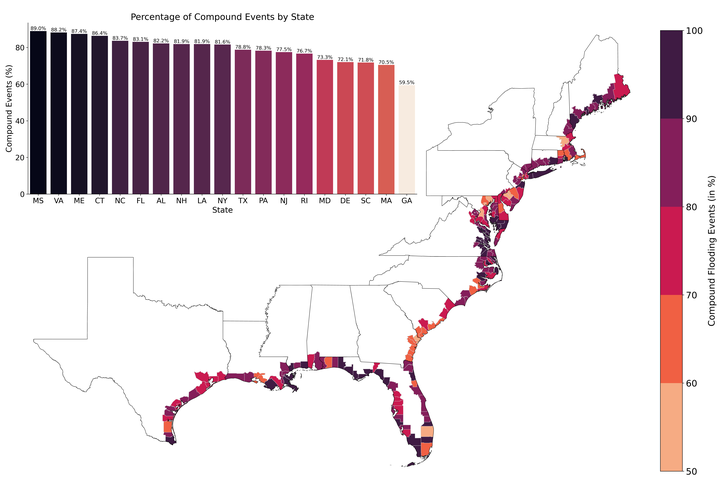Multivariate compound events drive historical floods and associated losses along the U.S. East and Gulf coasts

Abstract
Compound flooding events are a threat to many coastal regions and can have widespread socio-economic implications. However, their frequency of occurrence, underlying flood drivers, and direct link to past socio-economic losses are largely unknown despite being key to supporting risk and adaptation assessments. Here, we present an impact-based analysis of compound flooding for 203 coastal counties along the U.S. Gulf and East coasts by combining data from multiple flood drivers and socio-economic loss information from 1980 to 2018. We find that ~80% of all flood events recorded in our study area were compound rather than univariate. In addition, we show that historical compound flooding events in most counties were driven by more than two flood drivers (hydrological, meteorological, and/or oceanographic) and distinct spatial clusters exist that exhibit variability in the underlying driver of compound flood events. Furthermore, we find that in more than 80% of the counties, over 80% of recorded property and crop losses were linked to compound flooding. Nearly 80% of counties have a higher median loss from compound than univariate events. For these counties, the median property loss is over 26 times greater, and the median crop loss is over 76 times greater for compound events on average. Our analysis overcomes some of the limitations of previous compound-event studies based on pre-defined flood drivers and offers new insights into the complex relationship between hazards and associated socio-economic impacts.
CITATION
Ali, J., Wahl, T., Morim, J., Enriquez, A. R., Gall, M., & Emrich, C. T. (2025).
Multivariate compound events drive historical floods and associated losses along the U.S. East and Gulf coasts. Nature npj Natural Hazards, 2, 19. https://doi.org/10.1038/s44304-025-00076-5